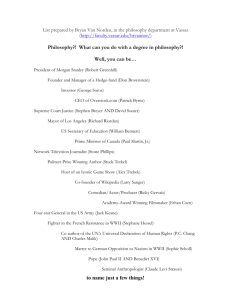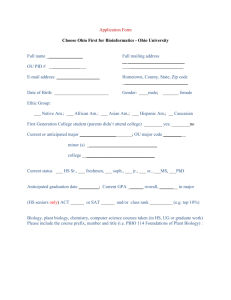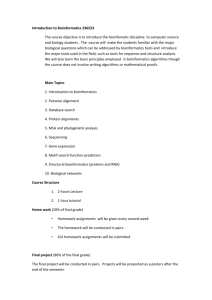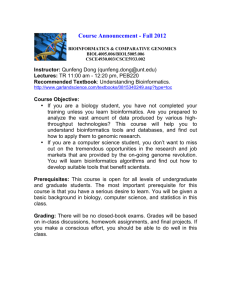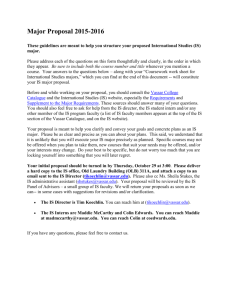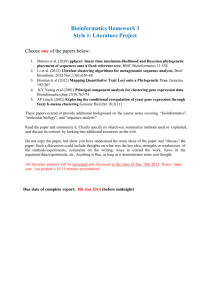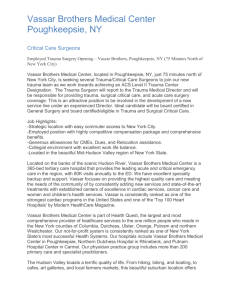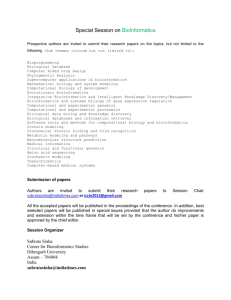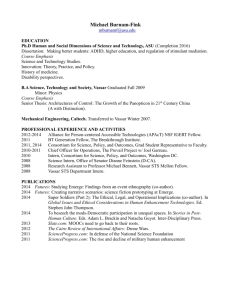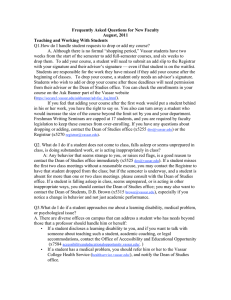Course Info
advertisement
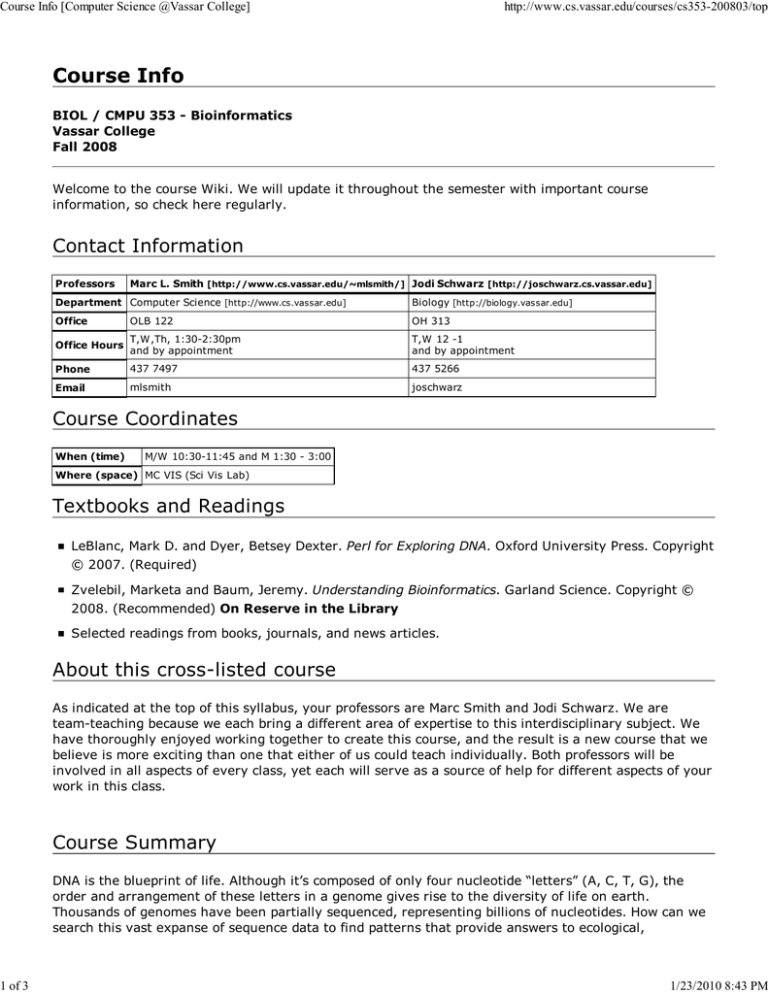
Course Info [Computer Science @Vassar College] 1 of 3 http://www.cs.vassar.edu/courses/cs353-200803/top Course Info BIOL / CMPU 353 - Bioinformatics Vassar College Fall 2008 Welcome to the course Wiki. We will update it throughout the semester with important course information, so check here regularly. Contact Information Professors Marc L. Smith [http://www.cs.vassar.edu/~mlsmith/] Jodi Schwarz [http://joschwarz.cs.vassar.edu] Department Computer Science [http://www.cs.vassar.edu] Biology [http://biology.vassar.edu] Office OLB 122 OH 313 Office Hours T,W,Th, 1:30-2:30pm and by appointment T,W 12 -1 and by appointment Phone 437 7497 437 5266 Email mlsmith joschwarz Course Coordinates When (time) M/W 10:30-11:45 and M 1:30 - 3:00 Where (space) MC VIS (Sci Vis Lab) Textbooks and Readings LeBlanc, Mark D. and Dyer, Betsey Dexter. Perl for Exploring DNA. Oxford University Press. Copyright © 2007. (Required) Zvelebil, Marketa and Baum, Jeremy. Understanding Bioinformatics. Garland Science. Copyright © 2008. (Recommended) On Reserve in the Library Selected readings from books, journals, and news articles. About this cross-listed course As indicated at the top of this syllabus, your professors are Marc Smith and Jodi Schwarz. We are team-teaching because we each bring a different area of expertise to this interdisciplinary subject. We have thoroughly enjoyed working together to create this course, and the result is a new course that we believe is more exciting than one that either of us could teach individually. Both professors will be involved in all aspects of every class, yet each will serve as a source of help for different aspects of your work in this class. Course Summary DNA is the blueprint of life. Although it’s composed of only four nucleotide “letters” (A, C, T, G), the order and arrangement of these letters in a genome gives rise to the diversity of life on earth. Thousands of genomes have been partially sequenced, representing billions of nucleotides. How can we search this vast expanse of sequence data to find patterns that provide answers to ecological, 1/23/2010 8:43 PM Course Info [Computer Science @Vassar College] 2 of 3 http://www.cs.vassar.edu/courses/cs353-200803/top evolutionary, agricultural, and biomedical questions? Bioinformatics applies high-performance computing to discover patterns in large sequence datasets. In this class students from biology and computer science work together to formulate interesting biological questions and to design algorithms and computational experiments to answer them. Working together We do not expect to turn biologists into computer scientists, or vice versa, in the 13 short weeks of this course. We do expect each student to contribute his/her expertise in their respective areas of study, and to work as part of a collaborative team. The success of this course depends on our ability to learn from each other. Goals For biology students: 1. to get beyond the point-and-click mentality of bioinformatics, and to understand what this statement means 2. to teach biology to your computer science collaborators 3. to formulate novel genomic questions and address them using bioinformatic approaches For computer science students: 1. to understand biological problems sufficiently to model them 2. to translate biological structures into data structures 3. to work with biologists to design algorithms For all of us: 1. to learn to speak each other’s language 2. to apply the scientific method to experiments in silico (experimental computer science) 3. to work as part of an interdisciplinary collaborative research team Coursework and Grades To assess your understanding, there will be frequent written and programming assignments both in class, and assigned as homeworks. The due dates of these assignments will be determined as we progress. In addition you will design and conduct a significant research project that will be due at the end of the semester. Your final grade for the course will be calculated according to the following: 10% Participation 60% Assignments and Projects 30% Research Project Based on the weighted average of your graded coursework, your letter grade will be determined 1/23/2010 8:43 PM Course Info [Computer Science @Vassar College] 3 of 3 http://www.cs.vassar.edu/courses/cs353-200803/top according to the standard 90, 80, 70, 60 cutoffs. For example, 90% or above is an A; 80% or above, but below 90%, is a B; etc. Pluses or minuses may be added at the instructors’ discretion. Submitting programming assignments 1. cd into your bioinformatics directory on bioinf.cs.vassar.edu 2. Within your bioinformatics directory, create a directory named “project#”. For example: joschwarz@n1:joschwarz/bioinformatics/> mkdir project01 3. From jEdit, save your script to your bioinformatics/project# directory. Give the file the same name as the name of the directory. 4. From your bioinformatics directory, use the “submit” script to submit the project directory containing your file joschwarz@n1:~/bioinformatics> submit project1 Attendance We are a community of learners, but you must be present to help one another. You provide a unique and valuable contribution to every class. The questions you ask help us all understand better the course material. Missing class deprives this community of your insights and understanding. So, please notify your professor before any classes or labs you know you will miss. We worry about you when you’re not present. More practically, part of your grade (10%) is based on participation, and you must be present to participate. Excessive absences tend to hurt one’s overall performance in this class. Academic Integrity Don’t cheat. Read Originality and Attribution: A guide for student writers at Vassar College. Moreover, the guidelines that apply to writing in general, apply equally to the writing of computer programs. Copying someone else’s code without attribution amounts to plagiarism. Likewise, give proper attribution for the help you receive. School policy dictates instructors must report all suspected incidents of cheating to their department chair. Did you read the previous sentence? Please don’t put yourself or me in that position. When in doubt, ask one of us before seeking any help from another source. Students with disabilities Academic accommodations are available for students with disabilities who are registered with the Office of Disability and Support Services. Students in need of disability accommodations should schedule an appointment with me early in the semester to discuss any accommodations for this course which have been approved by the Office of Disability and Support Services, as indicated in your DSS accommodation letter. courses/cs353-200803/top.txt Last modified: 2008/09/02 17:49 by mlsmith 1/23/2010 8:43 PM
